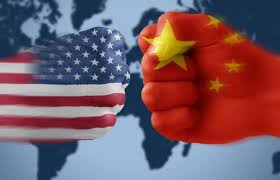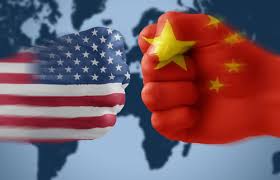
Arguing they violate Beijing's commitments to the World Trade Organization (WTO) and give an unfair advantage to Chinese manufacturers, the United States challenged China's export duties on nine key metals and minerals.
China said that the duties had been imposed as part of efforts at environmental protection and that it respected WTO rules.
The Obama administration’s attitude towards enforcing international trade agreements has come under fire from Republican presidential candidate Donald Trump and from within Obama's own Democratic party who have argued that the US administration is not taking a tough stance on enforcing the trade agreements.
With 22 WTO cases filed against trading partners since 2009 - including 16 aimed at China, Vice President Joe Biden later touted President Barack Obama's trade enforcement record as being more aggressive than past administrations in a speech at the Port of San Diego.
China has imposed export duties on the raw materials of antimony, cobalt, copper, graphite, lead, various magnesia compounds, talc, tantalum and tin which are key inputs into U.S. industries, including aerospace, autos, electronics and chemicals, said the U.S. Trade Representative Michael Froman adding that the administration case seeks to remove China's export duties of 5 percent to 20 percent on those materials.
While Chinese competitors do not have to pay them, encouraging companies to locate production in China, the the duties impose higher costs on U.S. manufacturers, he said.
"These duties are China's attempt to game the system so that raw materials are cheaper for their manufacturers and more expensive for ours. This scheme is directly at odds with WTO commitments China has made, and, as we've shown time and again, we will hold them accountable to their commitments," Froman said in a statement.
It would handle it according to the WTO dispute resolution process said China's Commerce Ministry while expressing regret at the decision.
The export duties had been imposed to help with sustainable development and were done so in the face of "daily worsening pressure on resources and the environment", said China.
"They are a part of overall measures to strengthen environmental protection and accord with WTO rules," it said.
China has committed that it would eliminate export duties for all products other than those listed in a specific annex, which exclude the nine metals and minerals named in the case, said the Office of the U.S. Trade Representative (USTR), which it said were part of the terms of its joining the WTO in 2001.
The United States won a ruling against Chinese import duties on certain U.S. high-tech steel products and China in April agreed to scrap some export subsidies as a result of other WTO challenges, USTR says.
Steep anti-dumping and anti-subsidy duties on a range of Chinese steel products have been imposed y the U.S. Commerce Department in the meanwhile.
After accusing the United States of deliberately misinterpreting WTO rules in applying anti-dumping duties on Chinese-made stainless steel sheet and strip products, China's Ministry of Commerce said on Wednesday that it would seek relief from the WTO in what is being regarded as a signal that the steel trade brawl will keep escalating.
Obama administration officials said that though the value of individual mineral imports in some cases are relatively small, they have a big impact on industries.
(Source:www.reuters.com)
China said that the duties had been imposed as part of efforts at environmental protection and that it respected WTO rules.
The Obama administration’s attitude towards enforcing international trade agreements has come under fire from Republican presidential candidate Donald Trump and from within Obama's own Democratic party who have argued that the US administration is not taking a tough stance on enforcing the trade agreements.
With 22 WTO cases filed against trading partners since 2009 - including 16 aimed at China, Vice President Joe Biden later touted President Barack Obama's trade enforcement record as being more aggressive than past administrations in a speech at the Port of San Diego.
China has imposed export duties on the raw materials of antimony, cobalt, copper, graphite, lead, various magnesia compounds, talc, tantalum and tin which are key inputs into U.S. industries, including aerospace, autos, electronics and chemicals, said the U.S. Trade Representative Michael Froman adding that the administration case seeks to remove China's export duties of 5 percent to 20 percent on those materials.
While Chinese competitors do not have to pay them, encouraging companies to locate production in China, the the duties impose higher costs on U.S. manufacturers, he said.
"These duties are China's attempt to game the system so that raw materials are cheaper for their manufacturers and more expensive for ours. This scheme is directly at odds with WTO commitments China has made, and, as we've shown time and again, we will hold them accountable to their commitments," Froman said in a statement.
It would handle it according to the WTO dispute resolution process said China's Commerce Ministry while expressing regret at the decision.
The export duties had been imposed to help with sustainable development and were done so in the face of "daily worsening pressure on resources and the environment", said China.
"They are a part of overall measures to strengthen environmental protection and accord with WTO rules," it said.
China has committed that it would eliminate export duties for all products other than those listed in a specific annex, which exclude the nine metals and minerals named in the case, said the Office of the U.S. Trade Representative (USTR), which it said were part of the terms of its joining the WTO in 2001.
The United States won a ruling against Chinese import duties on certain U.S. high-tech steel products and China in April agreed to scrap some export subsidies as a result of other WTO challenges, USTR says.
Steep anti-dumping and anti-subsidy duties on a range of Chinese steel products have been imposed y the U.S. Commerce Department in the meanwhile.
After accusing the United States of deliberately misinterpreting WTO rules in applying anti-dumping duties on Chinese-made stainless steel sheet and strip products, China's Ministry of Commerce said on Wednesday that it would seek relief from the WTO in what is being regarded as a signal that the steel trade brawl will keep escalating.
Obama administration officials said that though the value of individual mineral imports in some cases are relatively small, they have a big impact on industries.
(Source:www.reuters.com)





